Every year, nearly 9.5 million tons of dates are cultivated worldwide. That is as much as, for example, strawberries. Date harvesting starts every summer, European consumers eagerly await the first of these locally-grown soft fruits and even enjoy an almost year-round supply thanks to imports. Yet, dates are relatively unknown in much of Europe.
Ariel Immerman, who owns a packing house where dates from Hadiklaim (an Israeli growers’ cooperative and the world’s largest supplier of Medjool dates) are packed. “People around the world may know what dates are, but usually they’ve never tasted them, let alone Medjool dates.” Hadiklaim, as a market leader, plans to change that.
Fresh, semi-dried, and dried
Only 108,000 tons of Medjool dates are annually grown worldwide, says Hadiklaim GM, Yaniv Cohen. That is barely a percent more than the total global date production. In addition Hadiklaim also cultivates, and markets, eight other varieties. The cooperative markets fresh Bahri and Super Fresh Medjool dates, with unique taste and an unforgettable texture.
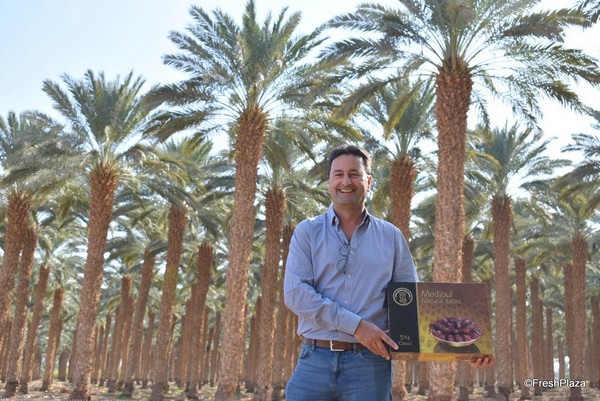 Yaniv Cohen, GM of Hadiklaim
Yaniv Cohen, GM of Hadiklaim
Hadiklaim also sells naturally dried Deglet Nour, Medjool, Ameri, Deri, Hadrawi, Halawi, Hayani, and Zahidi dates. Hadiklaim cooperative markets the cream of the crop - Medjoul dates - under the King Solomon brand with its premium iconic familiar black and gold colored packaging.
In the packaging facility, the dates are graded according to two factors: calibers, of which there are six - the larger the dates, the more expensive - and peel (loose-skin). Here, the larger the surface area and more firmly connected to the pulp it is, the higher the quality. By combining stages of both characteristics, Hadiklaim arrives at 16 quality categories. The largest dates with fully connected peel and pulp make up the premium quality. “We’re one of the few companies that split Medjool dates into so many categories. We want the correct product to reach the correct customer,” says Cohen.
Egypt leads the pack
Actually, Israel is a small date producer. Of the 9,454,213 tons grown worldwide in 2020, according to FAOSTAT, Israel accounted for only 48,984 tons, barely 0.5% of the total, putting it in 18th place in the world ranking. With nearly 1.7 million tons, Egypt tops that, with Saudi Arabia (over 1.5 mln tons), Iran (nearly 1.3 mln tons), and Algeria (more than 1.1 mln tons) following. Other countries with significant production of between 300,000 and 750,000 tons are - in order of production volume - Iraq, Pakistan, Sudan, Oman, Tunisia, and the United Arab Emirates. Morocco harvested over 130,000 tons, and Turkey just more than 60,000 tons.
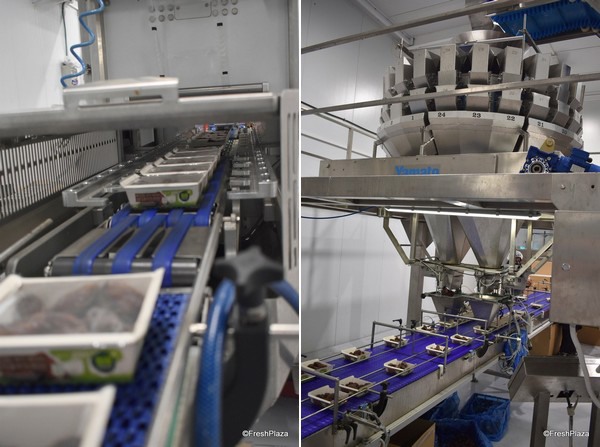
On the left the packaging gets sealed on the right is an automatic weigher and filler
However, regarding date exports, Israel only has to stand back for the UAE, Saudi Arabia, Iraq, and Iran. In date-growing countries, most are consumed locally. And as many as half of all the world’s Medjools - a date originally from Morocco - grow on palm trees in Israel. That is thanks to the ideal climate and soil conditions along the Jordan River, from Lake Tiberias through the Dead sea and to the RedSea.
“And of those, we harvest and market 20.000 tons, about a fifth of the global production,” Cohen adds proudly. “The global harvest estimate for next year is 122,000 tons; in ten years, they expect a figure of 300,000 tons. That’s almost three times more than today, but it will still be only three percent of the world’s date production. Many dates sell for $1 or even $0.50/kg. The cheapest Medjools trade at $4/kg; the most expensive at $12/kg., Premium quality dates are 20 times pricier than the cheapest. That’s highly unusual for fruit and vegetables.”
Expanding Medjool production
Hadiklaim GM says new Medjool production will increase mainly in Egypt and Morocco, countries with lower cost structures than Israel. “They can, thus, market this product less expensively. We have to use a sophisticated cultivation and marketing strategy to prepare for that,” he explains. Currently, Hadiklaim exports to 50 countries. This Israeli growers’ cooperative delicacy also finds its way to regions like North and South America and to Asia - which has significantly increased in sales over the last 5 years.
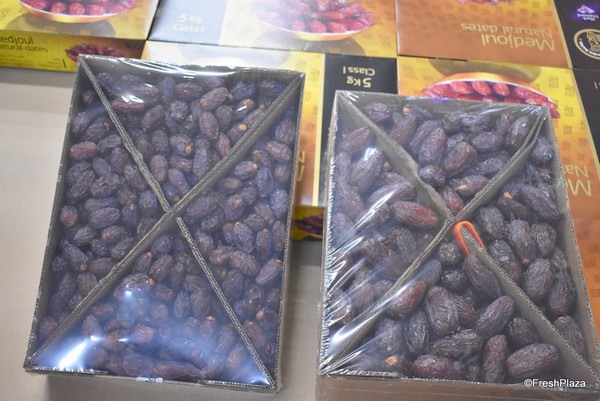
5kg packaging
Automation ensures efficiency
According to Immerman, Israel has the best Medjool cultivation region in the world, but workers are quite expensive and hard to find. “We could have sent the dates somewhere to be packed more cheaply, or we had to modernize and automate. We deliberately choose the latter.” Hadiklaim has about a dozen packinghouses, "some larger than others," he adds.
Besides efficiency, food safety is also a reason to automate and robotize the packaging facilities. “We are constantly investing in invocative processes. We’ve decided to increase our packing houses’ food-safety standards and we’re heavily investing in automation- in machinery and robotics to lead a new quality and food safety standards and to stay as the date industry's spearhead. We’ve already invested in an ongoing improvement process of our packaging aspects. For now, we’re one of the only companies worldwide that can fully automatically pack soft Medjool dates," Immerman continues.
Eventually, the entire packaging process will be fully automated and will be much more efficient. “We’ll have two people left to do final checks. We want to minimize the risks of contamination and infection. We get dates in many different sizes, sort them out accurately according to our strict uniform standards, so each date package contains uniformly delicious dates. In the past, we used to manually sort dates only into four quality categories; as some packing houses in Israel still do. Currently Hadiklaim's optical sorting machine divides dates into 16 grades.
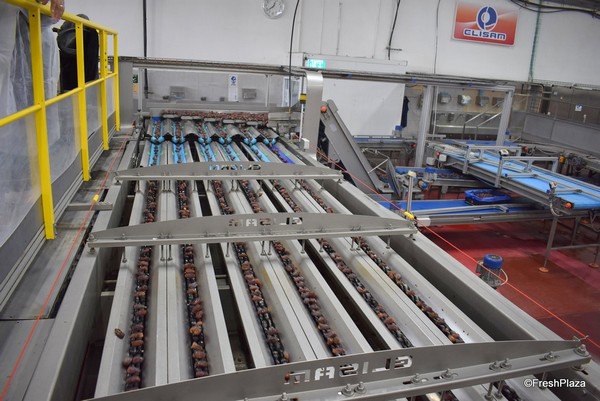
Sorting machine of Elisam
The more clearly defined the output, the higher the selling price. And more automation means greater cost-efficiency. “That’s vital for our growers because, in this cooperative, they own the farm but pay packaging costs. Every shekel they can save on sorting and packaging per output kilogram is a shekel more income,” Immerman explains.
Growers face challenges
The last two years were barely profitable for date cultivation. “The mild weather, when the crops needed heat, means there was five to ten percent less production. Plus, the strong shekel is making exports more difficult. And inflation in Europe is also making dates sales – a product that, due to its unfamiliar niche nature, isn’t at the top of people’s shopping list anyway – even less likely,” says Hadiklaim GM.
This year, we’re launching a new major project with which we plan to boost Medjool consumption in Europe. We’ll make sure Europeans not only get to know dates but also how they taste. And once you taste them, you’re sold,” he claims. Readers of www.agf.nl will learn all about it in a forthcoming article about Hadiklaim to be published early February.
Hadiklaim's mission is to introduce Medjool dates as a healthy & tasty fruit around the globe, and invite more and more people to enjoy date's taste and nutritional benefits.
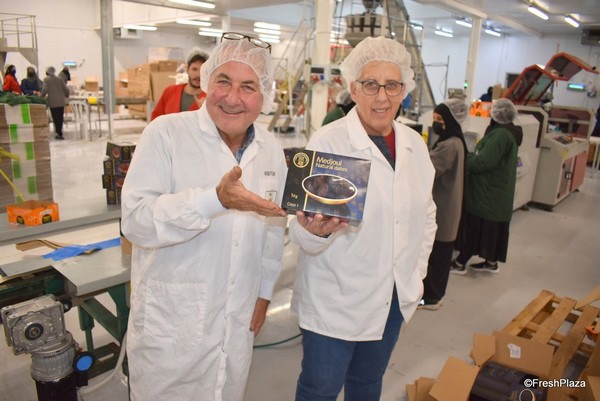
On the left Ariel Immerman
Hadiklaim’s office is in Rosh HaAyin, ten kilometers east of Tel Aviv. The cooperative includes about 100 growers with a total of about 12,000 palm trees. There are two locations that package dates year-round, nine that operate seasonally, and three specifically for retail . The company is BRC, GlobalGAP, Bio USDA, and IFOAM certified.
For more information:
Tal Akerman – Tabakman (marketing director)
Hadiklaim
19 Hamelacha St., P.O.Box 11468
Rosh HaAyin 4809149 (Israel)
Tel: +972 (3) 6389555
Email: [email protected]
www.hadiklaim.com










